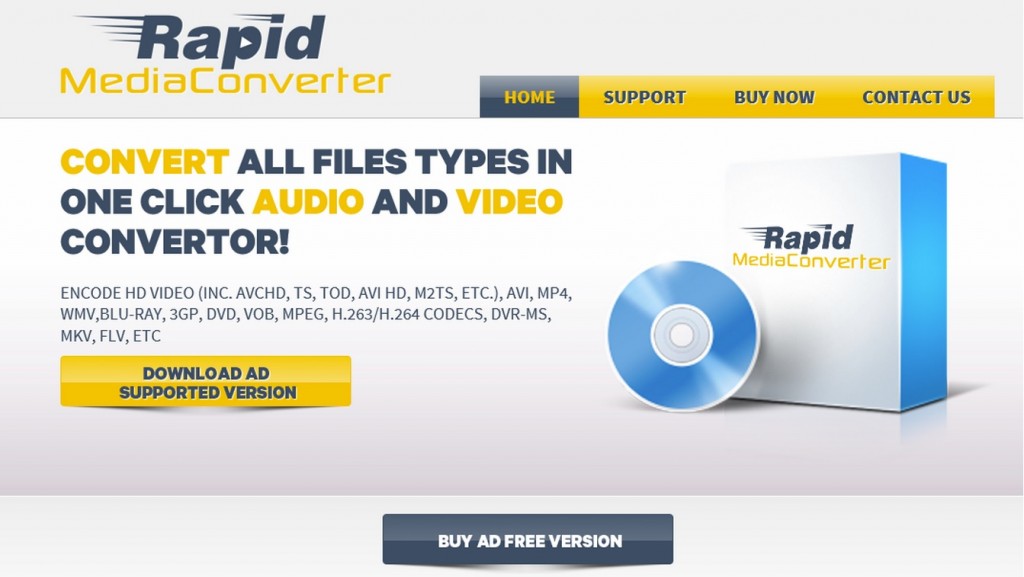I wrote this article to help you remove Rapid Media Converter. This Rapid Media Converter removal guide works for Chrome, Firefox and Internet Explorer.
Rapid Media Converter is considered as another adware application, which is capable of flooding your browser with numerous commercial advertisements that might seriously threaten your system security. As this advertisement-supported program is compatible with the major web browsers – Internet Explorer, Google Chrome, and Mozilla Firefox, it is responsible for all the commercial pop-up advertisements which appear on them.
Similarly to the most adware applications, Rapid Media Converter is so skillful that it can make you download it without even realizing it. In most cases, the adware enters your virtual machine bundled with other freeware and keeps its presence in secret until the multiple adverts start showing up on your monitor. Actually, this is not unusual at all, because freeware usually travels bundled with malware as this is the easiest access point to the system. For that reason, computer users should be very careful when installing new software on their machines and read all the terms and conditions provided by the setup wizard of the program.
Sometimes Rapid Media Converter uses other methods to infiltrate your PC. These include hiding behind spam email attachments, corrupted links and websites, or just posing as a bogus system or a program update for your Java or Adobe Flash Player. Therefore, if you want to avoid unwillingly installing adware, remember that haste, naivety, and distraction will certainly not help you at all.

As already mentioned-above, once installed on the system, Rapid Media Converter provides you with multiple commercial adverts and intrusive pop-ups while you’re browsing the web. The main problem with these ads is the fact that they often contain links which might redirect you to corrupted websites and could seriously threaten your personal security. Besides, some of these websites promote suspicious installers that are filled with unknown programs which could cause harm to your OS. Still, in case your virtual machine does not get infected with malware, it might become slower and experience frequent system crashes instead, which would be rather annoying for you.
Apart from flooding your monitor with all these numerous commercial advertisements and making your PC slower, Rapid Media Converter is capable of monitoring your virtual activities and recording your browsing history. Once the adware collects enough data about you, it starts providing you with customized advertisements which are related to your virtual interests and preferences in order to make you open them. Every click you make brings profit to the third parties hiding behind the program and continues its existence.
Keep in mind that Rapid Media Converter is an advertising-supported application, meaning that every ad you click on, gains profit for the third parties hiding behind this program. At the same time, all the information that Rapid Media Converter collects about you could be used for malicious purposes. Thus, you should ignore all the provided commercials the moment they pop-up on your monitor. Also, you must erase Rapid Media Converter from the system without any hesitation as this is the only way to terminate all the intrusive ads.
Rapid Media Converter Removal
 Before starting the real removal process, you must reboot in Safe Mode. If you are familiar with this task, skip the instructions below and proceed to Step 2. If you do not know how to do it, here is how to reboot in Safe mode:
Before starting the real removal process, you must reboot in Safe Mode. If you are familiar with this task, skip the instructions below and proceed to Step 2. If you do not know how to do it, here is how to reboot in Safe mode:
For Windows 98, XP, Millenium and 7:
Reboot your computer. When the first screen of information appears, start repeatedly pressing F8 key. Then choose Safe Mode With Networking from the options.

For Windows 8/8.1
Click the Start button, next click Control Panel —> System and Security —> Administrative Tools —> System Configuration.

Check the Safe Boot option and click OK. Click Restart when asked.
For Windows 10
Open the Start menu and click or tap on the Power button.

While keeping the Shift key pressed, click or tap on Restart.

 Here are the steps you must perform to remove the hijacker from the browser:
Here are the steps you must perform to remove the hijacker from the browser:
Remove From Mozilla Firefox:
Open Firefox, click on top-right corner ![]() , click Add-ons, hit Extensions next.
, click Add-ons, hit Extensions next.

Look for suspicious or unknown extensions, remove them all.
Remove From Chrome:
Open Chrome, click chrome menu icon at the top-right corner —>More Tools —> Extensions. There, identify the malware and select chrome-trash-icon(Remove).

Remove From Internet Explorer:
Open IE, then click IE gear icon on the top-right corner —> Manage Add-ons.

Find the malicious add-on. Remove it by pressing Disable.

Right click on the browser’s shortcut, then click Properties. Remove everything after the .exe” in the Target box.


Open Control Panel by holding the Win Key and R together. Write appwiz.cpl in the field, then click OK.

Here, find any program you had no intention to install and uninstall it.

Run the Task Manager by right clicking on the Taskbar and choosing Start Task Manager.

Look carefully at the file names and descriptions of the running processes. If you find any suspicious one, search on Google for its name, or contact me directly to identify it. If you find a malware process, right-click on it and choose End task.

Open MS Config by holding the Win Key and R together. Type msconfig and hit Enter.

Go to the Startup tab and Uncheck entries that have “Unknown” as Manufacturer.
Still cannot remove Rapid Media Converter from your browser? Please, leave a comment below, describing what steps you performed. I will answer promptly.

